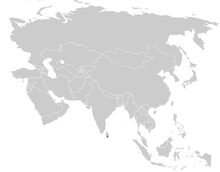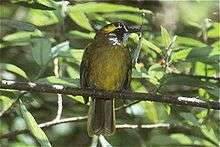Yellow-eared bulbul
| Yellow-eared bulbul | |
|---|---|
 | |
| Scientific classification | |
| Kingdom: | Animalia |
| Phylum: | Chordata |
| Class: | Aves |
| Order: | Passeriformes |
| Family: | Pycnonotidae |
| Genus: | Pycnonotus |
| Species: | P. penicillatus |
| Binomial name | |
| Pycnonotus penicillatus Blyth, 1851 | |
 | |
| Synonyms | |
|
Kelaartia penicillata | |
The yellow-eared bulbul (Pycnonotus penicillatus) is a member of the bulbul family of passerine birds. It is an endemic resident breeder in the highlands of Sri Lanka.
This is a bird of jungle and wooded farmland. Despite its restricted range, it is quite readily found at sites such as Horton Plains and Victoria Park in Nuwara Eliya. It builds its nest in a bush; two eggs is a typical clutch.


The yellow-eared bulbul is about 20 cm (7.9 in) in length, with a long tail. It has olive upperparts and yellowish underparts. The crown of the head is grey, and there are yellow ear tufts and a yellow patch below the eye. There is a white tuft in front of the eye and the throat is also white.
Sexes are similar in plumage, but young birds are duller than adults. The flight is bouncing and woodpecker-like. Yellow-eared bulbuls feed on fruit and insects.
It was formerly placed in the monotypic genus Kelaartia, named after Dr. E.F. Kelaart.
Cultural references
In Sri Lanka, this bird is known as galu-guduwa or kaha kondaya (කහ කොන්ඩයා "yellow hair") in Sinhala language.[2] It appears in a 10-rupee Sri Lankan postage stamp[3] and can also be seen on the new LKRරු5000 note of Sri Lanka.
References
- ↑ BirdLife International (2012). "Pycnonotus penicillatus". IUCN Red List of Threatened Species. Version 2013.2. International Union for Conservation of Nature. Retrieved 26 November 2013.
- ↑ http://www.bnhsenvis.nic.in/pdf/vol%203%20(1).pdf
- ↑ http://www.birdtheme.org/country/srilanka.html
- Birds of India by Grimmett, Inskipp and Inskipp, ISBN 0-691-04910-6
